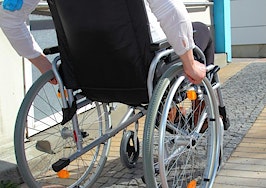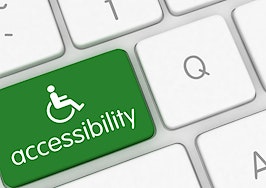Two consumers have filed a civil rights lawsuit against Zillow Group seeking to compel the company to make its websites accessible to people with visual disabilities.
Attorneys for plaintiffs Fredericka Nellon and Sofia Montano, both of whom are legally blind, filed the complaint Tuesday in the U.S. District Court of Eastern Massachusetts. Nellon and Montano both use screen readers and the voiceover function on their respective iPhones to navigate the internet.
The plaintiffs allege that Zillow Group’s websites — Zillow, Trulia, StreetEasy, HotPads, Naked Apartments, RealEstate.com, Out East, and Zillow Home Loans — are not compatible with screen readers and therefore violate Title III of the Americans with Disabilities Act (ADA), which requires websites of public accommodation to provide people with disabilities access to online content that is equal to access provided to non-disabled people.
“By failing to make its Websites available in a manner compatible with computer screen reader programs, Defendant … deprives blind and visually-impaired individuals the benefits of its online goods, content, and services — all benefits it affords non-disabled individuals — thereby increasing the sense of isolation and stigma among these Americans that Title III was meant to redress,” the April 16 complaint said.
About 8.1 million Americans have difficulty seeing, including 2 million who are blind or unable to see, and “accessible technology is both readily available and cost effective,” the complaint added.
The National Association of Realtors has previously warned that both real estate agents and businesses face liability over inaccessible websites. Real estate brokerage Compass and Redfin’s WalkScore have both faced similar suits, though the former was settled last month while the latter was dismissed with prejudice.
In an emailed statement, a Zillow Group spokesperson told Inman, “We are aware of the lawsuit filed in federal court. While we won’t discuss ongoing litigation, we take the issue of developing features and products that are accessible to all seriously.”
According to the complaint, both plaintiffs attempted to access Zillow Group’s websites from their respective New Bedford, Massachusetts homes, but found them “largely unusable” because there are no labels associated with input fields, which prevents a screen reader user from properly using the home search functions on the websites.

Screen shot from Nellon v. Zillow Group complaint
The plaintiffs also found that some material, such as a “Home Buyers Guide” that has a play button that is a link with no text, made it difficult for a visually disabled person to know where a link leads.

Screen shot from Nellon v. Zillow Group complaint
“[B]ecause the [Zillow Group] Websites are not accessible to the blind, it leaves [Ms. Montano] in the difficult position of needing someone with vision to help her navigate the Websites,” the complaint said.
“In a market where homes are often rented quickly, the delay in being able to research and find homes due to the inaccessible Websites create timeframe issues and other difficulties.”
The complaint seeks a permanent injunction that requires Zillow Group to hire a website accessibility consultant acceptable to the plaintiffs who will help the company improve the accessibility of its websites.
The plaintiffs also ask that the court order Zillow Group to provide its employees with web accessibility training, perform an automated accessibility audit on a periodic basis, perform end-user accessibility testing on at least a quarterly basis, create and post a web accessibility policy to all of its websites and provide a way to report accessibility-related problems, and allow the plaintiffs and their experts to monitor Zillow Group’s websites for up to two years after the consultant declares them to be free of accessibility violations.
The complaint also asks for payment of “actual, statutory, and punitive damages,” the costs of the suit and attorneys’ fees, including the cost of monitoring Zillow Group’s compliance.







